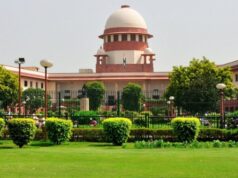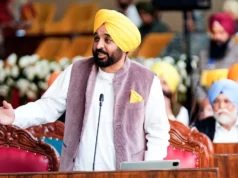The goal of the proposed legislation is to update the 1995 law managing Waqf properties. It will be presented to the Rajya Sabha later today.
After a 12-hour debate that saw the government and opposition debate the controversial Waqf Amendment law till after midnight, the law easily passed the Lok Sabha early on Thursday. Despite the heated dispute, the government’s numerical superiority ultimately prevailed. The bill was approved by 288-232 votes at around two in the morning.
The goal of the proposed legislation is to update the 1995 law managing Waqf properties. It will be presented to the Rajya Sabha later today.
However, the new bill’s controversial clauses require two non-Muslims to serve on Waqf Boards and the Central Waqf Council. Additionally, only those who have been Muslims for at least five years are eligible to donate real estate to Waqf. Additionally, government property designated as Waqf will no longer be its property under the proposed law; instead, the local Collector will decide who owns it.
The opposition claimed that the measure was illegal, claiming that the Joint Parliamentary Committee, which was established to review the bill, failed to take their recommendations into account.
“Defame (and) disenfranchise minorities” and a “4D assault on the Constitution” were the government’s stated goals, according to the Congress.
AIMIM head Asaduddin Owaisi claimed he was “tearing up the law like Mahatma Gandhi did” in regard to British law in South Africa during a symbolic protest.
The administration said that rather than being about religion, the measure was about property and how it should be managed. With the help of the Congress’s appeasement tactics, Waqf has seized vast amounts of land and properties. The modified law would allow Waqf property to benefit women and children, however there were widespread anomalies that prevented this from happening. Additionally, the BJP claimed that the Waqf measure was created after extensive consultation and that non-Muslim minorities had endorsed it.
Union Minister Amit Shah gave a lengthy list of assets he said were granted for Waqf in support of the bill. The list contained territory owned by the government, other religions, temples, and others.
“Waqf acquired properties in the Lutyens zone of Delhi and began occupying government land… A 400-year-old temple property in Tamil Nadu was designated as Waqf’s. Waqf was granted land for a five-star establishment for $12,000 per month. “A number of properties, including Chandra Shekhar Azad Park in Prayagraj, that belonged to various religions were designated as Waqf property,” he said.
Donating someone else’s property is not permitted. You give away something that belongs to you,” he stated.
Union Minister Kiren Rijiju mentioned a lawsuit that has been pending in Delhi since 1970 that involves multiple assets, including the former Parliament building, when he introduced the bill.
“If we had not introduced this amendment today, even the building we are sitting in could have been claimed as Waqf property,” he stated.
Mr. Shah blamed the Congress, stating that this law would not have been necessary if the Wakf Act had not been amended in 2013.
“The severe Wakf law was created overnight in 2013 with the intention of appeasing. Consequently, barely 25 days prior to the elections, 123 properties in Delhi’s Lutyens zone were turned over to the Wakf,” he stated.
Additionally, he denied that non-Muslims will be on the Wakf board, stating, “Those who look after religious property will not be on that board.” We don’t want to become involved at all. In order to increase their vote bases, the opposition is attempting to intimidate the minority.
Spirited Attack From Opposition
The bill is a “attack on the Constitution… The aim is to dilute the Constitution, defame and disenfranchise minorities… divide Indian society,” according to Congressman Gaurav Gogoi, who gave a lengthy reply to Mr. Rijiju.
“Despite the Minority Commission holding four meetings in 2023, the necessity of a Waqf modification bill was not brought up. “I would like to know if the Minority Affairs Ministry or another department wrote this bill,” he continued.
Harsimrat Kaur Badal, an MP for the Shiromani Akali Dal, attacked the Center harshly, saying it was attempting to divide the minority.
“How is it that the party that has no Muslim members in Parliament is commemorating Muslims today? What did the polarization-based party remember about Muslims today? Taking a jab at the BJP, she said.
“Uttar Pradesh, which will vote in 1.5 years, is home to 27% of the (Waqf) properties. You have built Ayodhya and destroyed our ancient gurudwara. You would have added a Muslim member to the Ayodhya committee if you had had decent intentions. Every minority is being violated by you. The MP, whose party broke with the BJP during the farmers’ protest, went on to say, “You are the Tukde Tukde gang.”
Provisions Of Amended Bill
The Waqf Amendment Bill states that trusts established by Muslims in accordance with any legislation would no longer be regarded as Waqf. Restoring pre-2013 regulations, it states that only Muslims who have been practicing for at least five years may dedicate their property to Waqf. Prior to the declaration of Waqf, women must also get their inheritance, with special consideration given to widows, divorced women, and orphans.
Additionally, the measure suggests that a higher-ranking authority look into government properties that are allegedly Waqf.
The senior government official will have the last word in any disagreements regarding whether a piece of property belongs to the government or Waqf. This takes the place of the current system, which uses Waqf tribunals to make such decisions.
In order to promote diversity, the law also suggests adding non-Muslim members to the state and central Waqf boards.
Prior to the declaration of Waqf, women must get their inheritance, with special consideration given to widows, divorced women, and orphans.
The Waqf (Amendment) Bill will be challenged in court, according to the All India Muslim Personal Law Board. As with farmers, we will plan events all around the nation. We will block highways and use all nonviolent means to resist the bill if necessary,” said Mohammad Mohsin, a spokesman for the law board.







